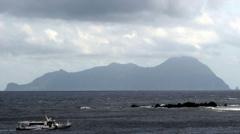For over 600 years, the residents of central Japan celebrated the appearances of Miwatari on frozen Lake Suwa as a divine sign. However, with recent changes in climate patterns causing its absence, the community now perceives a troubling imbalance in nature and their traditional beliefs.
Ancient Winter Traditions Echo Climate Change in Japan's Lake Suwa

Ancient Winter Traditions Echo Climate Change in Japan's Lake Suwa
The mystical phenomenon of Miwatari, once a symbol of balance and divine presence, has become a harbinger of climate challenges as warmer winters disrupt centuries-old customs.
In the central mountains of Japan, the changing climate and its effects on winter traditions are stirring concern among local residents. Historically, the mystical Lake Suwa would freeze solid during the colder months, giving rise to an extraordinary natural phenomenon known as the Miwatari. This long, jagged ridge of ice is believed to be a divine sign from Japan’s Shinto gods, emerging after nights of frigid temperatures. Each appearance was met with reverence, as it reassured the community of the natural balance under the gaze of the divine.
For generations, the Miwatari has served not only as a captivating sight but also as a significant marker for residents. Since 1443, locals have meticulously documented its annual appearances, intertwining these records with key historical events, thus preserving a remarkable archive of climate history and cultural significance.
However, with modern climate changes leading to warmer winters, the Miwatari has become increasingly rare. The absence of this ice formation is now viewed as a dire omen, with residents expressing concern over their vanishing traditions. Shinto priest Kiyoshi Miyasaka, who has witnessed these transformations firsthand, emphasizes the profound impact on community beliefs and practices. The local perception of nature's equilibrium is being challenged as the Miwatari—a symbol of the revered connection between their ancestors and the environment—disappears.
The ongoing conversation around Lake Suwa reveals a deeper narrative about climate change and its implications for cultural practices worldwide. The story of Miwatari serves as a reminder of the intricate bond between nature, spirituality, and historical continuity—a bond that is increasingly threatened by the realities of our warming planet. As residents grapple with these shifts, they are left questioning how to honor their traditions in a future marked by uncertainty.




















